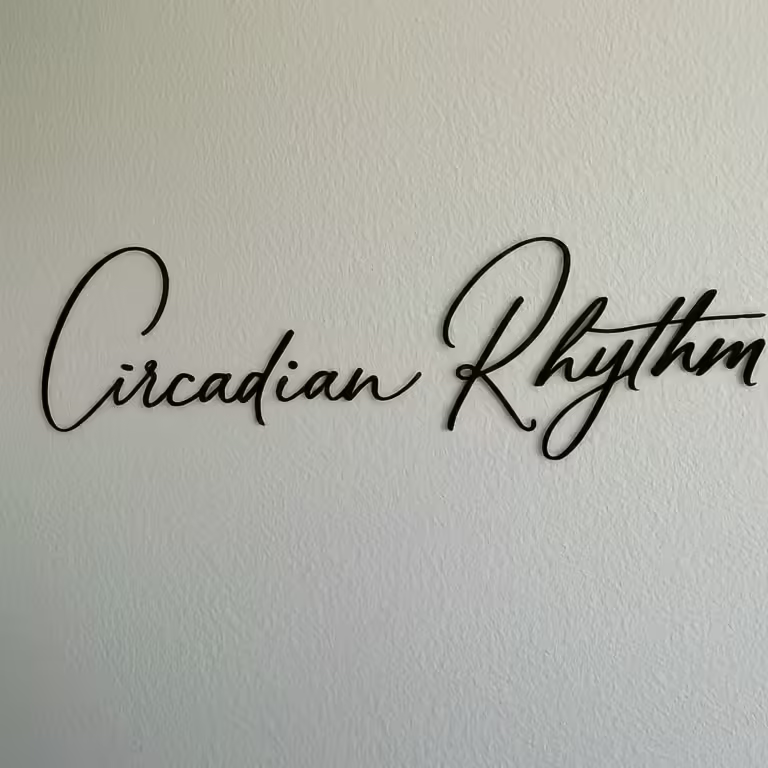Medically reviewed by Dr Itender Pal Singh
A circadian rhythm is your body’s natural, internal process that governs your sleep-wake cycle, alongside various other critical functions. Often referred to as your internal clock, this rhythm follows a 24-hour cycle, influencing not only when you sleep and wake but also when you eat and how your body operates throughout the day. Even minor disruptions to this rhythm can leave you feeling off balance. However, making small adjustments to your routine can help you restore this delicate balance. In some cases, consulting a healthcare professional for treatments, including medications and supplements, may be necessary.
In this article-
How Does Circadian Rhythm Work?
Circadian rhythms are intrinsic cycles that ebb and flow over a 24-hour period, primarily driven by exposure to light and darkness. These rhythms play a crucial role in managing bodily processes related to daily activities, with the sleep-wake cycle being the most recognized.
The central hub for these rhythms lies in your brain, specifically in a cluster of nerve cells that coordinate signals received from your surroundings. For example, exposure to morning sunlight signals your body to wake up, while the fading light of dusk triggers the release of melatonin, a hormone that facilitates sleep.
Sensitivity to Light
Your circadian clock is particularly responsive to light at specific times, such as:
- About two hours before your typical bedtime
- During the night
- Approximately one hour after your usual waking time
Energy levels fluctuate naturally throughout the day, with notable dips in alertness occurring between:
- 2 a.m. and 5 a.m.
- 2 p.m. and 5 p.m.
- 12 a.m. and 2 a.m.
However, these rhythms are not universal; they vary from person to person, influenced by genetics as well as external factors and daily routines.
The Role of Sleep in Circadian Rhythms
Sleep is fundamental to both physical and mental well-being. It replenishes energy, aids in memory retention, and bolsters immunity. Maintaining a consistent sleep-wake cycle is vital for optimal functioning.
Circadian rhythms also regulate other critical bodily functions, including:
- Hormone release
- Digestion and appetite
- Body temperature
- Alertness and reaction times
These rhythms even affect metabolic health, playing a role in cholesterol and blood sugar regulation, and can influence the risk of certain mental health conditions, including depression.

What Disrupts Your Circadian Rhythm?
Several factors, both external and internal, can throw off your circadian rhythm, leading to various health issues.
Environmental Triggers
Sunlight: The amount of natural light you receive each day is a significant determinant of your internal clock’s timing. More exposure to natural light usually means higher energy levels.
Caffeine: Consuming this stimulant, especially in the afternoon or evening, can interfere with your sleep-wake patterns.
Jet Lag: Traveling across different time zones can disrupt your sleep schedule, particularly in terms of how and when your body produces melatonin.
Shift Work: Irregular work hours, especially when they change frequently, can cause significant shifts in your internal clock.
Electronic Devices: Exposure to blue light from screens (such as phones, computers, and TVs) within two hours of bedtime can make it difficult to fall and stay asleep. This artificial light can severely disrupt your circadian rhythm. In contrast, red, orange, and yellow light have minimal impact.
Daylight Saving Time: Even a small shift, like adjusting the clock by one hour, can desynchronize your circadian rhythm.
Visual Impairment: People with visual impairments may struggle with circadian rhythm processes since the brain relies on visual cues to manage these cycles.
Medications: Certain medications, depending on their type and timing, can disrupt your circadian rhythm.
The Impact of a Disrupted Circadian Rhythm
Adjusting to changes in your circadian rhythm, such as those caused by traveling to a new time zone or starting a job with different hours, can be challenging. This is why many parents of young children gradually adjust bedtimes before daylight saving time to minimize disruptions.
However, when your schedule shifts frequently, it can be tough to maintain a stable circadian rhythm, potentially leading to health problems.
Sleep Disorders Linked to Circadian Disruptions
Some sleep disorders are directly associated with a disrupted circadian rhythm, including:
- Delayed Sleep-Wake Phase Syndrome (DSPS): Characterized by going to bed at least two hours later than a conventional bedtime.
- Advanced Sleep-Wake Phase Syndrome (ASPS): Involves going to bed several hours earlier than the standard bedtime.
- Shift Work Sleep Disorder (SWD): Includes symptoms like insomnia and excessive fatigue related to working evening or early morning hours.
- Non-24-Hour Sleep-Wake Rhythm Disorder (N24HSWD): A condition where your sleep-wake cycle shifts progressively later each day.
- Jet Lag Disorder: Symptoms like extreme sleepiness, trouble sleeping, and digestive issues due to crossing multiple time zones.
Other Health Complications
Disrupted circadian rhythms can lead to additional health issues, such as:
- Night Eating Syndrome (NES): Characterized by high-calorie consumption in the evening and nighttime, often linked to weight gain and depression.
- Diabetes: Resulting from the body’s resistance to or inadequate production of insulin.
- Cardiovascular Disease: An umbrella term for conditions affecting the heart and blood vessels.
- Mental Health Disorders: Including depression and bipolar disorder.
- Seasonal Affective Disorder: A type of depression triggered by seasonal changes.
People who work irregular hours or night shifts may be at a higher risk of developing these conditions.
Recognizing When Your Circadian Rhythm Is Off
While feeling tired occasionally is normal, certain signs indicate that your circadian rhythm may be negatively impacting your health. These include:
- Difficulty falling or staying asleep
- Persistent fatigue or exhaustion
- Trouble focusing or concentrating
- Unexplained aches, pains, or digestive issues
How to Reset Your Circadian Rhythm
Irregular sleep patterns can disrupt your health and quality of life, but there are steps you can take to realign your circadian rhythm.
Lifestyle Changes
Adopting the following habits can help you achieve a more stable circadian rhythm:
- Relaxing Bedtime Routine: Engage in activities that help you unwind physically and mentally before bed.
- Limit Screen Time: Avoid using screens at least two hours before bedtime. Consider using blue light glasses if you must use devices.
- Consistent Sleep Schedule: Establish a regular bedtime and wake time, even on weekends.
- Healthy Sleep Environment: Ensure your bedroom is cool, dark, and quiet.
- Avoid Napping: If you must nap, keep it under 30 minutes.
- Regular Exercise: Exercise daily but avoid intense workouts close to bedtime.
- Caffeine and Alcohol: Limit consumption, especially in the evening.
Light Therapy
Circadian rhythms respond well to light exposure, both natural and artificial. Incorporating light therapy into your routine can help reset your sleep-wake clock.
Morning Sunlight: Try to get bright sunlight exposure first thing in the morning to wake up and regulate your sleep-wake cycle.
Limit Artificial Light: Be mindful of your screen time and exposure to indoor lights, especially before bed.
Bright Light Therapy: Products like light boxes, desk lamps, and dawn simulators can help reset your circadian rhythm. Your healthcare provider may recommend using these for 45-60 minutes daily.
When to Seek Professional Help
If lifestyle changes don’t seem to help, it may be time to consult a healthcare provider. Treatment options include:
Melatonin Supplements: These can assist in regulating your sleep cycle.
Melatonin Medication: Useful for treating specific sleep disorders like non-24-hour sleep-wake rhythm disorder.This natural hormone is made by a gland in the brain at night (when it’s dark out). Melatonin levels in the body are low during daylight hours and high during the night.
Melatonin supplements, available over-the-counter, may be useful in treating jet lag and sleep-onset insomnia in elderly people with melatonin deficiency. But they haven’t been approved by the FDA, so it isn’t clear how much melatonin is safe and effective.
Sleep-Promoting Medications: Drugs such as benzodiazepines can induce drowsiness and promote better sleep.Short-acting benzodiazepines, such as xanax, are often prescribed in the early treatment of a circadian rhythm disorder and are used in conjunction with behavioral therapy. Long-term use isn’t recommended because of potential side effects, such as the rebound phenomenon (the original problem returns at a higher level), and the risk of dependence.
Wake-Promoting Medications: Medications like modafinil and armodafinil can help increase alertness, especially for shift workers.
Your circadian rhythm plays a crucial role in regulating daily functions, from when you sleep to how you feel throughout the day. Disruptions to this natural cycle can lead to poor sleep and other health problems. Simple lifestyle adjustments, such as getting more natural light and practicing good sleep hygiene, can help reset a disrupted circadian rhythm.
Remember, each person’s internal clock is unique, and your genes influence whether you’re naturally a night owl or an early bird. Be patient with yourself as you work to stabilize or adjust your circadian rhythm. If your sleep-wake cycle continues to interfere with your daily life, don’t hesitate to reach out to a healthcare provider who can offer further guidance or refer you to a sleep specialist.
SOURCES–
Harrison manual of Internal Medicine
National Heart, Lung, and Blood Institute. Circadian rhythm disorders: Symptoms.
National Institute of General Medical Sciences. Circadian Rhythms
American Academy of Sleep Medicine: “Circadian Rhythm Sleep Disorders Fact Sheet.”
Cleveland Clinic: “Circadian Rhythm Disorders.”




Pingback: 12 Years on 30 Minute Sleep Daily? The Surprising Productivity Hack of a Japanese Entrepreneur - News To Your Home
Pingback: TV Actor Vikas Sethi Dies at 48: The Shocking Details Revealed - News To Your Home
Pingback: Headaches Explained – Causes, Types, and Effective Treatments - Healing Doctor